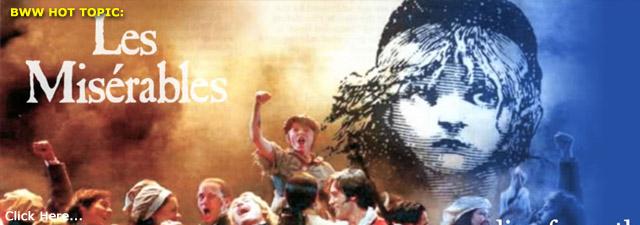BWW Reviews: LES MISERABLES From Stage to Screen
I remember when the Beatles masterpiece Sgt. Pepper's Lonely Hearts Club Band was released. I still have my vinyl copy. The music was revolutionary, but what made the album itself unique was tucked inside: a sheet of related cut-outs. A picture of Sgt. Pepper, a fake moustache, sergeant stripes: It was like a membership kit, proving you were a member of the band.
I had the same fan-girl reaction when I opened Les Miserables From Stage to Screen, by Benedict Nightingale and Martyn Palmer. In the interest of full disclosure, I've never seen Les Mis on stage, though I know people who have seen it dozens of times. Now I must find out what I've missed.
Any behind-the-scenes book must satisfy rabid fans, and this one won't disappoint. Nightingale and Palmer are nothing if not over-achievers. The statistics alone are staggering:
Over 11,000 performances in London's West End alone
Worldwide, over 100 companies have performed 48,000 times in 42 countries and 318 cities, for a total audience of over 60 million people.
A record 15 productions running simultaneously.
The show has been translated into 21 languages and has won almost 100 major awards.
There is, in fact, a school version.
The larger question, of course, is why? And why now for a film version?
Why did the character of the Artful Dodger, in a 1978 revival of Oliver! remind Alain Boublil of Gavroche in Victor Hugo's epic Les Miserables?
Why did he and Claude-Michel Schonberg believe they could succeed where even Puccini failed: to bring a 1,200 page novel to the musical stage?
Why did Cameron Mackintosh believe they could do it?
The detail in this book is close to overwhelming. At times reading like a how-to guide on creating a masterpiece, it also contains a wealth of little-known facts. It's an entertaining read.
From the original concept and staging in Paris, to London's West End, to Broadway and beyond, you'll have a front-row seat to the challenges and joys of adapting Les Miserables to stage and screen.
Much has been made of the decision to record the songs "live" in the film version, in one take. But by the time we've gotten to that chapter, it seems an easy and logical decision. After all, isn't that what the actors are called upon to do on stage? Changing the dynamic of those performances to allow for editing and lip-syncing would mean altering the interpretation in a way that no one thought acceptable. They didn't have to, because now the technology was available to make a film that could come close to recreating the experience of live theatre.
Depending on your religious persuasion, as you read Les Miserables From Stage to Screen, you may agree that there is a spiritual inevitability to this show. More than one person involved in the creation of Les Mis believed they were destined to play a certain role, or that God had a hand in this: they had no choice but to agree. Others believe the timing was critical: that the universal themes of Hugo's masterpiece, set against political upheavals and class warfare, spoke to a world that could identify all too well. This was a show that inspires a unique level of loyalty and commitment: in its creators, its performers, its audience.
The word "obsession" might also come to mind, but that's not a criticism. To create any work of art requires a single-minded determination to see it through. What may surprise you is how many people - in Paris, London, New York, and around the world - have shared that obsession.
Now back to my Sgt. Pepper analogy.
Bound into this book are a series of envelopes containing treasures to satisfy even the most diehard Les Mis fans: facsimiles of the Act 1 prop list and a program from the original Paris staging; international press reports on the 1832 Paris insurrection; programs and invitations from several countries; stage plans and posters; elevation drawings and call sheet from the film version; Jean Valjean's passport and much, much more.
My only quibble about the book is the binding. The spine feels flimsy and I hope it will stand up to the wear and tear of constant readings.
What looks deceptively like just a pretty book is love letter to the talented artists who brought Victor Hugo's tale to life. Nightingale and Palmer have created a fitting homage to one of the most important musicals in theatre history and its ground-breaking film version.
Reader Reviews
Videos


